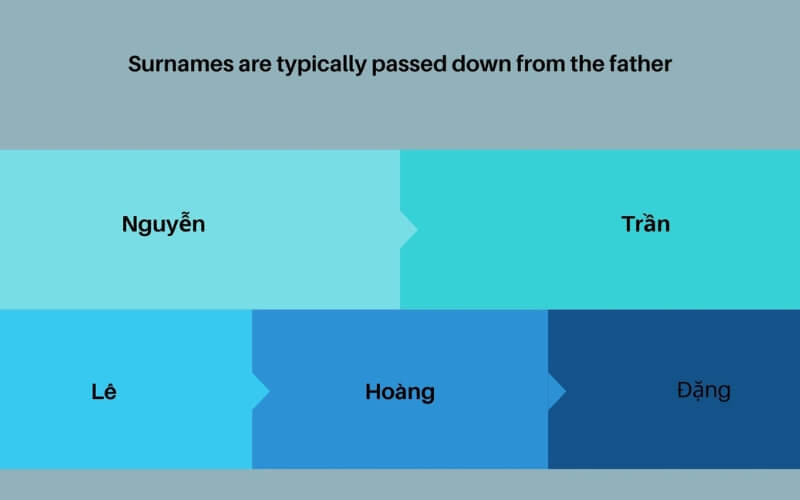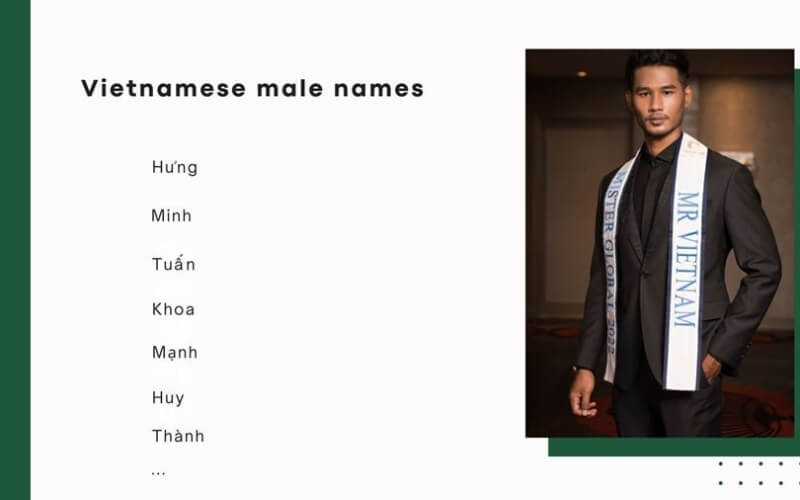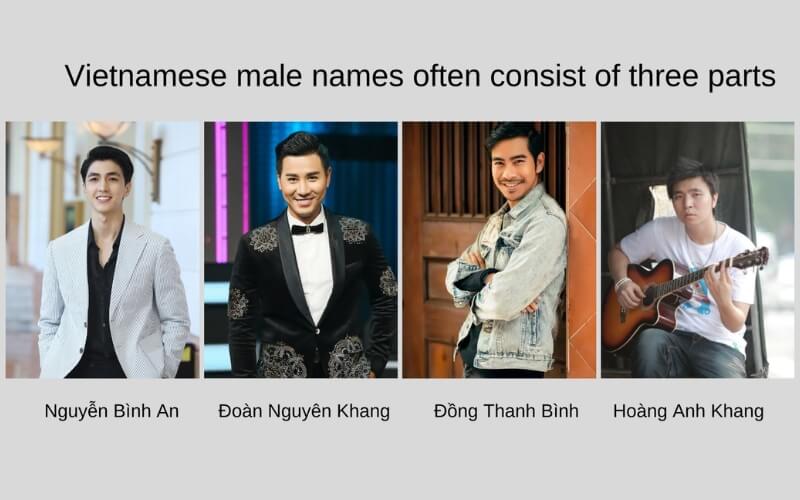
Vietnamese male names and Surnames: Complete Guide to Vietnamese Naming
Vietnamese male names and surnames represent a profound three-part naming system, combining family heritage with meaningful personal identifiers. From traditional last names that trace ancestral lineage to carefully chosen first names that embody parents’ hopes, each component carries unique cultural significance in Vietnamese society.
What Are the Most Common Vietnamese Family Names and Their Historical Origins?

Last names, or family names, are crucial in identifying a person’s lineage and social standing. By looking at common Vietnamese surnames, we can see how history and politics shaped family recognition.
Popular last names like Nguyễn, Trần, Lê, and Phạm come from ancient dynasties and reflect political history. For instance, Nguyễn is the most common surname, with over 38.4% of the population having this name. This can be traced back to the Nguyễn dynasty (1802–1945). During that time, many people changed their surnames to Nguyễn to show loyalty to the ruling family or to avoid political punishment. Similarly, the surnames Trần and Lê became widespread due to the influence of the Trần and Lê dynasties.
However, not all surnames are influenced by Chinese culture. Some, like Hồ, are native to Vietnam and show the independence of ancient Vietnamese tribes. While these surnames are less common, they still exist today, particularly in rural areas.
How Does the Middle Name “Văn” Reflect Vietnamese Cultural Values for Men?
The middle name in a Vietnamese man’s name holds a lot of importance. One of the most common middle names is “Văn.” It’s not just a simple word that goes between the last name and the first name; it carries a lot of cultural, historical, and social meaning.
In the past, men were considered the pillars of the family and were often valued more than women, as reflected in the old saying, “Nhất nam viết hữu, thập nữ viết vô,” meaning “One son is worth ten daughters.” Men had the main responsibility for studying, taking exams, and advancing in society. The middle name “Văn” comes from the desire to emphasize education and knowledge. Back in the day, only men could go to school and take exams, so the word “Văn” was used to show that someone was educated, a scholar, or had knowledge. Parents often gave their sons the middle name “Văn” as a way of expressing their wish that their child would grow up to be successful in education and have a good career. The tradition continues today, with Văn being used as a reminder of the importance of knowledge and intellectual success.
Why Do Vietnamese Male First Names Focus on Strength and Achievement?

First names for Vietnamese men often carry big meanings, symbolizing strength, morality, and success. It’s not just a way to call someone; it’s a representation of the hopes and aspirations parents have for their sons.
Names like Quang, Hùng, Vinh, Thành, or Thắng are often chosen because parents hope their sons will grow up to be strong, successful, and respected by society. During times of war, names like Chiến (meaning “warrior”), Thắng (“victory”), or Kiên (“steadfast”) were popular, as parents wished for their sons to contribute to the nation’s success and stand firm in the face of challenges. These names not only represented personal prayers but also reflected the feelings and hopes of the entire country during difficult times.
The sound of a name is also important in Vietnamese culture. A name that sounds pleasant and balanced is believed to bring good luck and advantages to the person. So, when naming their sons, parents avoid names that are harsh or difficult to pronounce, instead choosing ones that sound smooth and carry positive meanings.
How Do Vietnamese Male Names Connect Family Heritage and Social Structure?
Giving a name to a man in Vietnam is not just a personal matter; it also reflects the family’s structure and lineage. A man’s last name doesn’t just identify him; it also represents the continuation of family tradition, responsibility, and honor. In Vietnamese society, sons carry their father’s last name, symbolizing the connection between generations and the responsibility of maintaining the family line.
The middle name and first name reflect the parents’ hopes and the social values the family wants to pass down. The middle name “Văn” highlights the importance of education, while the first name shows the qualities parents wish to see in their sons. These three parts come together to create a naming system that not only personalizes but also connects the individual to the family and society.
What Are Popular Vietnamese Male Name Combinations Used Today?
Here’s a table of some of the most common names for Vietnamese men today:
| Last Name | Middle Name | First Name |
| Nguyễn | Văn | Kiên |
| Trần | Hữu | Tín |
| Lê | Đức | Bảo |
| Phạm | Minh | Đạt |
| Hoàng/Huỳnh | Ngọc | Khoa |
| Phan | Long | |
| Võ/Vũ | Nam | |
| Đặng | Kiệt | |
| Bùi | Trí | |
| Đỗ | Tài | |
| Dũng | ||
| Thắng |

In conclusion, Vietnamese male names and surnames not only represent personal identity but also carry deep cultural, historical, and familial significance. They reflect the traditions and values passed down through generations, linking individuals to their heritage and society.






